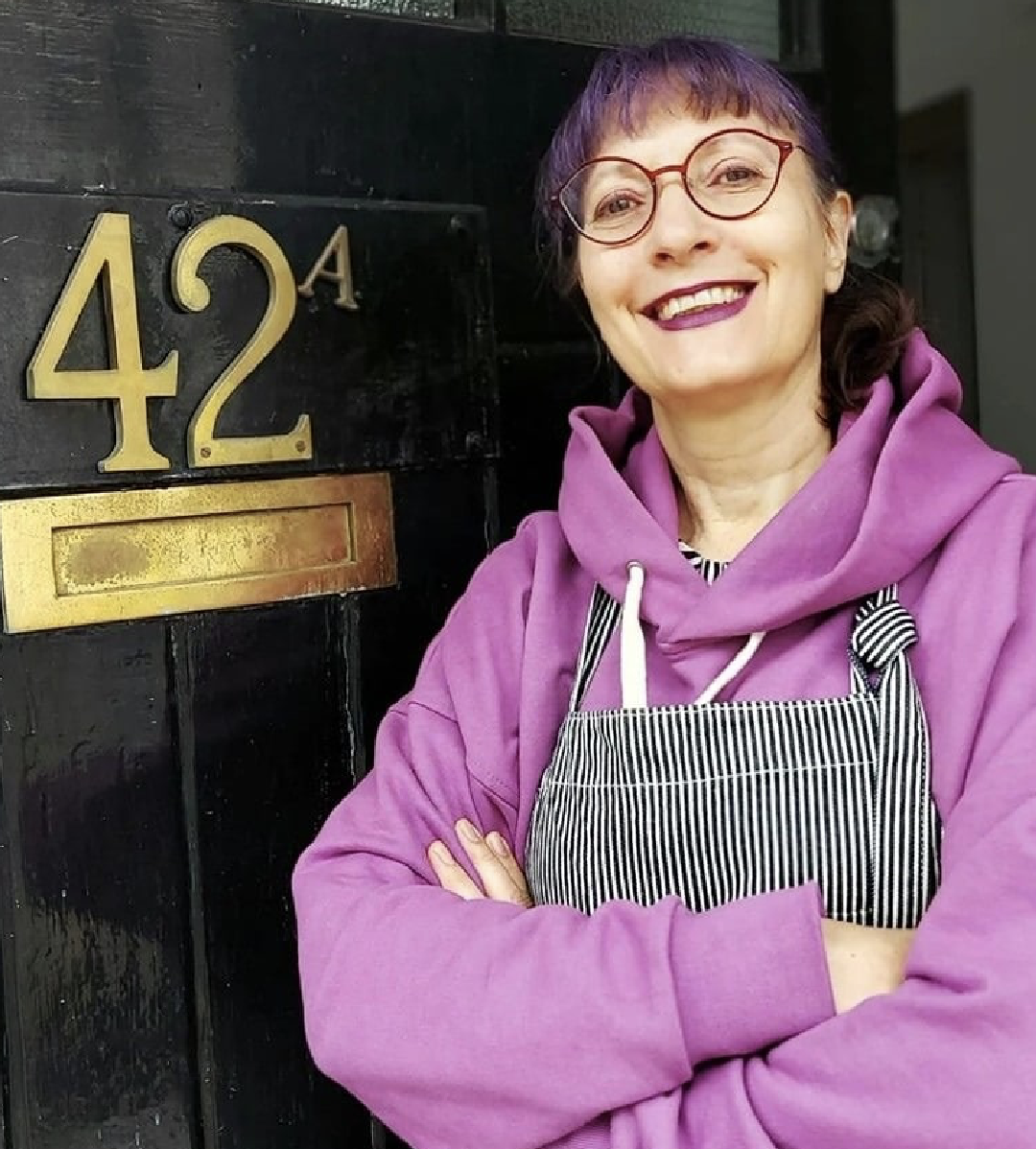Let's Talk Roses with Sarah McCartney
British perfumer Sarah McCartney, founder of the seriously exciting niche perfume brand 4160 Tuesdays, who also happened to be our guest-perfumer for Rose Retreat 2023 is “talking roses” with us.
Sarah is an entirely self-taught perfumer with a background in Maths & Sciences! She has been hand-making adventurous scents since 2011 in her artisan studio based in Hammersmith, West London.
Let’s talk Roses, Sarah!
Q1: What drew you to the world of perfumery, and how did your passion for roses come about?
I had been working for Lush Fresh Handmade Cosmetics for 14 years as the head writer, starting by myself editing The Lush Times, and I ended up running the international writing team. In 2010, I left to write a novel about a problem-solving perfumer and to explore some creative ideas, including a sustainable knitting community. In the novel, I described the perfumes my character made, including two rose fragrances, and I decided to learn perfumery so I could make them all.
It took me until 2015 to make my first dedicated rose fragrance, Raw Silk & Red Roses, and in the meantime, I had been getting more familiar with the rose materials available to perfumers: naturals, aroma-chemicals and bases.
Q2: Rose is a classical perfume ingredient, a symbol of beauty and romance. Could you describe your unique interpretation of a rose scent? How does a rose make you feel?
For reasons I never did understand, my mother disliked all roses except one, the Peace Rose, yellow with pink tips, first grown in 1935 in France, which was very popular in the mid-20th Century. We only had that in our garden at home. Like all small children, I adopted my mother’s views - until I learned to question them and decide for myself.
Now in my own small garden, I have three fragrant roses, including an extremely rare one cultivated by a friend’s grandfather, a fragrant violet/blue rose with hundreds of slim petals. I have made several rose fragrances, including Passion & Purity, which I made to capture its aroma.
Q3: As a self-taught perfumer, what challenges did you encounter while mastering the art of fragrance creation?
Most of the difficulties I had were practical, like how to comply with regulations, where to buy small quantities of bottles, and how to understand the way retail works in the UK, via distributors and agents. This is why I now run courses to help other outsiders to leap these barriers.
With perfume creation, the obstacles were sourcing the materials I wanted to buy in small quantities and getting hold of safety data sheets. It’s possible to have hundreds of ideas and to create a thousand different fragrances with fewer than 50 materials, so I never felt that I had missed starting small and growing my collection and knowledge step by step. I’m still learning.
Q4: Perfumery is both an art and a craft form that requires a keen sense of smell and the ability to translate emotions into olfactory experiences. Can you share a memorable moment when you successfully translated a personal experience or feeling into a rose-inspired fragrance?
My most recent is Salt Rose, the scent of a resilient wild rose growing in the sandy earth of the Thames estuary, surrounded by oyster shells and driftwood. After over a year of not leaving London - seven months of just being in West London - we went to the coast, to Whitstable in Kent, in June 2021, where there is a wonderful rose garden in a public park. Roses which smelled of lemons, peaches, apples, violets... The one I chose to capture when I came home was the wild rosa rugosa, also called the saltspray or beach rose. Whitstable is famous for its oysters, and their shells are crushed into the sand/earth by the water’s edge, where these roses were growing in tangled mounds. I used a driftwood accord, which I was making at the same time and combined these two strong aromas to make an even stronger one. This doesn’t always work - sometimes they compete - but this time they linked up to make something better.
Q5: Each perfume tells a story. In your opinion, what narrative or atmosphere does a rose-centred fragrance convey? Is there anything special about the essence of roses?
There is something extraordinary about the essence of roses, but I haven’t quite worked out what it is yet. I might never work out exactly what it is, but not everything can be explained, and I’m fine with that, in life as well as with roses.
Q6: Roses have been used in perfumery for centuries, making them an integral part of fragrance history. How do you strike a balance between honouring tradition and pushing the boundaries of innovation and contemporary techniques in your rose-inclusive/rose-centred creations?
At first, I was almost afraid to make a solo rose fragrance because it’s seen as one of the skills a perfumer must demonstrate. When I’d finally made a finished fragrance with natural rose and created a rose accord from six aromachemicals, I shrugged off the pressure of expectation and tradition and went back to work in my own style.
I am happy to acknowledge that tradition exists, then ignore it when I’m creating a fragrance. I always want to create something different. For me, using a rose is a practical way to make a perfume more beautiful, richer, and intriguing. If roses had been used for the first time last week in perfumery, then I’d probably use them in the same way as I do now.
Q7: The process of creating a perfume involves numerous ingredients and meticulous blending techniques. Could you walk us through the steps you take when developing a new rose perfume, from the initial concept to the final product?
I can spend weeks, months and sometimes years thinking about what to do. Sometimes a perfume name arrives in my head and I decide to make a fragrance which matches it; at other times, I will find a material and want to create a fragrance around it. With Passion & Purity, I needed to make the exact aroma of my friend’s rose, which blooms for a month each year, so for the first two years, I just smelled them and planned; in year three, I started to make it.
When I know in my head where I want to take the aroma, then I start with a central “Sun”. I see perfumes in a solar system structure, with the sun as its reason for being, then planets as accords which orbit the centre, harmonising and balancing. I use low-impact materials, which I have named clouds and nebulae, which smooth out the intense central structure; these are materials like Hedione and Iso E Super, which also help fragrances last longer and project further. My choice is to use sustainable, biodegradable materials.
Q8: The world of perfumery is constantly evolving, with new trends and customer preferences emerging. How do you stay inspired and adapt to these changes while remaining true to your love for fragrance and maintaining your signature style?
I observe, then allow industry trends to flow by. For artisan perfumers, there’s no point getting too involved in the new thing because new trends are always based around new molecules, and these are always “captives”; the only perfumers who can use them are those who work for the company which makes them. It’s like films. If there’s a blockbuster, everyone wants to do something similar and hopes to cash in on the fashion. I’ve never been interested in being part of the mass market - except to admire some of the exceptional work - because it’s risk-averse.
I would rather make fragrances that smell challenging and unfamiliar, in the hope that a small number of people love them.
Q9: Did you enjoy working with the Bulgarian Rose samples, the rose oil, and the rose absolute? Is there anything you would like to share with us about your experience with these materials?
I am currently obsessed with the power and beauty of your rose oil, and Helichrysum is my new best friend. I’m still enjoying it as I write.
Q10: What are your expectations about the Rose Retreat and the perfume-making days?
I hope to learn at least as much as I can share with everyone who will be there with us. This will be my first time in Bulgaria, so I am completely open to being delighted by each experience.
The downside: I am a night person, terrible at getting up early, and Bulgaria is two hours ahead of the UK, so I know that it’s going to be an effort for me to be human at breakfast time, but I’ll do my best!
I am a complete nerd, so I will probably ask questions about everything and be distracted by everything I see, hear, feel, taste, touch, and especially everything I smell. I’m very much looking forward to meeting everyone and helping them to create a rose fragrance that they will love.


